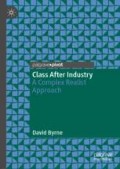Abstract
This short chapter presents a discussion of the political implications of the arguments and evidence about class which have formed the basis of the rest of the book. A distinction is drawn between the liberal focus on inequality alone and a socialist focus on the mechanisms generating an unequal class structure. The need for a politics of class which addresses the situation and concerns both of the dispossessed and ‘the middle’ is asserted.
Access this chapter
Tax calculation will be finalised at checkout
Purchases are for personal use only
References
Ainsley, C. (2018). The New Working Class. Bristol: Policy Press.
Byrne, D. S., & Ruane, S. (2017). Paying for the Welfare State in the 21st Century. Bristol: Policy Press.
Freire, P. (1972). The Pedagogy of the Oppressed. Harmondsworth: Penguin.
Nelson, J. I. (1995). Post-Industrial Capitalism. London: Sage.
O’Connor, J. (1982). The Meaning of Crisis. International Journal of Urban and Regional Research, 5(3), 301–328.
Standing, G. (2011). The Precariat: The New Dangerous Class. London: Bloomsbury.
Thompson, E. P. (1981). The Politics of Theory. In R. Samuel (Ed.), Peoples’ History and Socialist Theory. London: Merlin.
Umney, C. (2018). Class Matters. London: Pluto.
Wilson, R., & Pickett, K. (2010). The Spirit Level—Why Equality Is Better for Everyone. London: Penguin.
Author information
Authors and Affiliations
Corresponding author
Rights and permissions
Copyright information
© 2019 The Author(s)
About this chapter
Cite this chapter
Byrne, D. (2019). Conclusion: What Can Be Done. In: Class After Industry. Palgrave Pivot, Cham. https://doi.org/10.1007/978-3-030-02644-8_8
Download citation
DOI: https://doi.org/10.1007/978-3-030-02644-8_8
Published:
Publisher Name: Palgrave Pivot, Cham
Print ISBN: 978-3-030-02643-1
Online ISBN: 978-3-030-02644-8
eBook Packages: Social SciencesSocial Sciences (R0)

